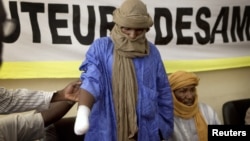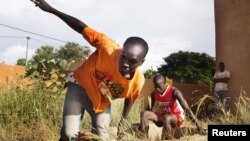BAMAKO, MALI —
International human rights groups say the al-Qaida-linked Islamist militants in control of northern Mali are intensifying human rights abuses against civilians, recruiting minors as young as 11 years old and systematically destroying important cultural and religious sites.
International watchdog group Human Rights Watch [HRW] condemns what it says are serious human rights abuses, and violations of international law, by the three armed Islamist groups in control of northern Mali since early April.
HRW says militants have carried out at least two executions by stoning, numerous floggings and at least eight amputations as punishments under their hardline interpretation of Sharia law, which HRW senior Africa researcher Corinne Dufka called a "cruel parody of justice."
Sharia law harshly enforced
She said the militants have set up an organized system of "Islamic courtrooms" where they hold regular trials once or twice a week.
"Complaints are brought by the local population and some of the complaints involve problems that took place even before the Islamists took over. They then arrest an individual, bring him or her in," said Dufka. "They are then detained in the Islamist police headquarters and then they are brought out for a so-called trial, which involves sitting in front of a group of judges, many of whom are foreigners, in which the person is basically given a chance to tell their version of events. And then a decision is very hastily made about their guilt or innocence."
The sentence, Dufka said, whether it be amputation or flogging, often is carried out immediately.
Amnesty International says the number of these speedy "sham trials" is increasing, as is the severity of the punishments.
Amnesty's Mali director, Saloum Traore, said they know of about 20 people, some at risk of amputation, currently waiting in detention centers in Gao.
Infractions vary from drinking and smoking, to alleged crimes like highway robbery and theft.
Upside, downside to rule of law
HRW's Dufka said residents credit the Islamists with filling a "rule of law vacuum" in the north, though they criticize the Islamists' methods.
"A number of people credit the Islamists with helping to restore security, particularly along the highways and byways of northern Mali, which for many years has been the subject of a lot of famous highway bandits," she said. "They really criticize the Malian police and gendarmerie, who of course have now left, for failing to address the problem of rising criminality."
HRW says the armed groups have recruited hundreds of adolescents into their ranks to serve as spies, guards, cooks and patrol officers. Dufka said witnesses say many youth also are carrying out punishments.
"Really in some cases taking the lead, in meting out particularly floggings and beatings, and particularly for things like people listening to music on their cell phones, for women not covering their heads and for smoking," she said.
Recruiting children through family
Dufka said HRW did not document any forced recruitment. The children, she said, appeared to be the younger relatives of current militants.
"We also documented many of the children and adults coming from villages, which for many years have practiced a much more conservative form of Islam, usually described by the local population to be a wahabbist form of Islam," said Dufka.
There are indications that settling disputes via Sharia law is not a completely foreign concept to northern Mali.
A leader of the Arab Berabiche community in Timbuktu told VOA that he saw "sharia courts" ruling on economic disputes, like land use and inheritance, as early as 2010 in some far-flung communities.
Amnesty's Traore said Mali's government must work quickly to liberate the north.
Traore said the Islamists have found fertile ground in the devout populations of northern Mali. He said the population appears ready to use whatever means possible to curb criminality, in particular theft. He said some are still resisting the Islamists, but the longer this goes on, the more adjusted the population will become and the more entrenched the Islamists will be.
Davastating cultural destruction
Regardless of what happens, Dufka said the landscape of northern Mali appears to have been forever changed. Sports, public congregation and festivities associated with births and weddings are now forbidden.
Timbuktu residents, she said, told her about their heartbreak as Islamists destroyed cemeteries, religious shrines and mausoleums, many of which were protected as UNESCO World Heritage sites. Their destruction, HRW says, constitutes a war crime.
"The saints that they prayed to for good health, for children, for a safe voyage, to do well in an exam. Praying to those saints which are such an important part of Timbuktu's heritage, as well as cleaning and taking care of and praying over the graves of their departed are extremely important to them," said Dufka.
Music, she said, has not been spared either.
"I spoke to one witness who described Islamists coming to a radio station in Timbuktu and filling up four rice bags full of recordings of local music that evidently a local music journalist had gone around and recorded over the last decade or so," said Dufka. "They described feeling extremely distraught knowing that this music, which is such an important part of Malian culture and had given so much to Africa and the world, has been lost forever."
Mali's interim president, Diouncounda Traore, said the government will try to negotiate a solution to the crisis in the north. Force, he said, is a last resort.
The armed groups say they are willing to negotiate, but not on the issue of Sharia law.
International watchdog group Human Rights Watch [HRW] condemns what it says are serious human rights abuses, and violations of international law, by the three armed Islamist groups in control of northern Mali since early April.
HRW says militants have carried out at least two executions by stoning, numerous floggings and at least eight amputations as punishments under their hardline interpretation of Sharia law, which HRW senior Africa researcher Corinne Dufka called a "cruel parody of justice."
Sharia law harshly enforced
She said the militants have set up an organized system of "Islamic courtrooms" where they hold regular trials once or twice a week.
"Complaints are brought by the local population and some of the complaints involve problems that took place even before the Islamists took over. They then arrest an individual, bring him or her in," said Dufka. "They are then detained in the Islamist police headquarters and then they are brought out for a so-called trial, which involves sitting in front of a group of judges, many of whom are foreigners, in which the person is basically given a chance to tell their version of events. And then a decision is very hastily made about their guilt or innocence."
The sentence, Dufka said, whether it be amputation or flogging, often is carried out immediately.
Amnesty International says the number of these speedy "sham trials" is increasing, as is the severity of the punishments.
Amnesty's Mali director, Saloum Traore, said they know of about 20 people, some at risk of amputation, currently waiting in detention centers in Gao.
Infractions vary from drinking and smoking, to alleged crimes like highway robbery and theft.
Upside, downside to rule of law
HRW's Dufka said residents credit the Islamists with filling a "rule of law vacuum" in the north, though they criticize the Islamists' methods.
"A number of people credit the Islamists with helping to restore security, particularly along the highways and byways of northern Mali, which for many years has been the subject of a lot of famous highway bandits," she said. "They really criticize the Malian police and gendarmerie, who of course have now left, for failing to address the problem of rising criminality."
HRW says the armed groups have recruited hundreds of adolescents into their ranks to serve as spies, guards, cooks and patrol officers. Dufka said witnesses say many youth also are carrying out punishments.
"Really in some cases taking the lead, in meting out particularly floggings and beatings, and particularly for things like people listening to music on their cell phones, for women not covering their heads and for smoking," she said.
Recruiting children through family
Dufka said HRW did not document any forced recruitment. The children, she said, appeared to be the younger relatives of current militants.
"We also documented many of the children and adults coming from villages, which for many years have practiced a much more conservative form of Islam, usually described by the local population to be a wahabbist form of Islam," said Dufka.
There are indications that settling disputes via Sharia law is not a completely foreign concept to northern Mali.
A leader of the Arab Berabiche community in Timbuktu told VOA that he saw "sharia courts" ruling on economic disputes, like land use and inheritance, as early as 2010 in some far-flung communities.
Amnesty's Traore said Mali's government must work quickly to liberate the north.
Traore said the Islamists have found fertile ground in the devout populations of northern Mali. He said the population appears ready to use whatever means possible to curb criminality, in particular theft. He said some are still resisting the Islamists, but the longer this goes on, the more adjusted the population will become and the more entrenched the Islamists will be.
Davastating cultural destruction
Regardless of what happens, Dufka said the landscape of northern Mali appears to have been forever changed. Sports, public congregation and festivities associated with births and weddings are now forbidden.
Timbuktu residents, she said, told her about their heartbreak as Islamists destroyed cemeteries, religious shrines and mausoleums, many of which were protected as UNESCO World Heritage sites. Their destruction, HRW says, constitutes a war crime.
"The saints that they prayed to for good health, for children, for a safe voyage, to do well in an exam. Praying to those saints which are such an important part of Timbuktu's heritage, as well as cleaning and taking care of and praying over the graves of their departed are extremely important to them," said Dufka.
Music, she said, has not been spared either.
"I spoke to one witness who described Islamists coming to a radio station in Timbuktu and filling up four rice bags full of recordings of local music that evidently a local music journalist had gone around and recorded over the last decade or so," said Dufka. "They described feeling extremely distraught knowing that this music, which is such an important part of Malian culture and had given so much to Africa and the world, has been lost forever."
Mali's interim president, Diouncounda Traore, said the government will try to negotiate a solution to the crisis in the north. Force, he said, is a last resort.
The armed groups say they are willing to negotiate, but not on the issue of Sharia law.





